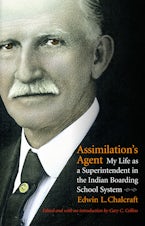"Editor Collins provides a very comprehensive look not only at Chalcraft's memoir, but also in his introduction an illuminating, important overview of federal Indian education and assimilation policies. . . . [Chalcraft's memoir] adds a valuable voice to the historical discussion on the providence of federal Indian policy in general and, more specifically, federal programs intended to bring about complete cultural assimilation by way of education."—Choice
"Cary Collins has unearthed and expertly edited an indispensable resource for historians of United States Indian policy and western history."—Laura Woodworth-Ney, Western Historical Quarterly
"This book, written with a great deal of grace, explains an enormous amount of what happened during that shameful time [of forced assimilation]. Collins' extensive—and heavily researched—introduction offers a large amount of heretofore unavailable information. This is a book that illuminates and taps into the emotions. It will make you angry at times--not at the book but at the tactics the government used in aid of an unsupportable cause."—Statesman Journal (Salem, Oregon)
"A well-edited and detailed autobiography, Assimilation's Agent is the work of a man committed to the policy of total assimilation."—Todd Leahy, Montana The Magazine of Western History
"Chalcraft's memoir, though it does not and cannot redeem this unsavory era, nevertheless bears witness to the lessons that need to be gleaned from its tragedy."—Lynne M. Getz, Pacific Northwest Quarterly
"Since few of these employee's recollections have survived, Edwin L. Chalcraft's memoir. . . . gains significance. In an account penned shortly before his death in 1943, Chalcraft has reminded us of the dogma of his times, one predicated on Indian assimilation into the dominant society, while simultaneously deflecting readers' eagerness to stereotype these agents of federal power."—Margaret Connell Szasz, Oregon Historical Quarterly
"A great strength of this book is Collins' thorough analysis of BIA philosophy and procedure, and how that played out in the life of one man and the Indian children he sought to 'educate.'"—Garrit Voggesser, Journal of the West

